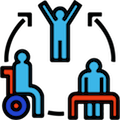What is independent advocacy?
Advocacy helps the most vulnerable in society navigate their way through some of life’s challenges. Whether it’s attending hospital appointments
or meeting with the local authority, an independent advocate will be there to support those in need, helping them build their confidence,
and giving them a voice in matters that affect their life, health and wellbeing.
There are different types of advocacy
Professional Advocacy
an independent advocate works with you to help you sort out your problem. The advocate might be paid or be a volunteer.


Citizen Advocacy
an ordinary member of the public gets to know you well over a long period of time. They stand alongside you and help you to get what you need.
Self Advocacy
people come together in groups to speak up about things that are important to them. Self-advocacy groups try to change the way people feel about themselves and change other people’s attitudes. They also try to change services and policies. This is also called collective advocacy.


Peer Advocacy
is when someone else with a learning disability helps someone with learning disabilities speak up for themselves.
Why might I need independent advocacy?
There are lots of reasons why someone may seek independent advocacy. You could require support dealing with specific professional services,
such as Social Work, or need help getting to grips with legal jargon and processes, or with voicing your opinion in official meetings.
Are there different types of advocacy?
Yes, there are various ways to provide advocacy. Although there’s no ‘one size fits all’, the main services we provide are
citizen advocacy, professional advocacy, collective advocacy and peer advocacy.
If you would like to speak
If you would like to speak to someone about advocacy or find out more about what we do, then please click on get in touch

